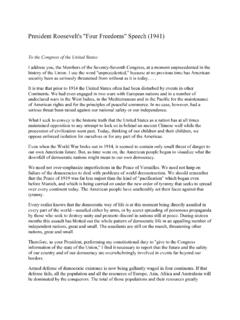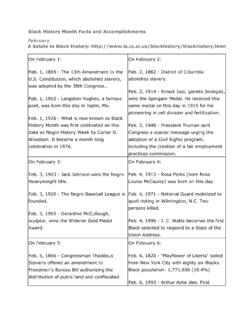Transcription of Causes of the 2003 Iraq War (2003-2011) - KNILT
1 Causes of the 2003 iraq War ( 2003 - 2011 ). Many people have different opinions about the iraq War. Some believe that our nation shouldn't have gotten involved in the affairs of other countries at all, while others support the war completely. Still others think that the government was right to take action, but that the time has come now to pull out of iraq . Despite these opinions however, the truth of the matter is that we did in fact get involved with the issues in iraq and there is nothing we can do now to change that. We can however, learn the reasons out country had for taking action and what effects these actions had on us, those in iraq and the rest of the world. One reason for the involvement of the in iraq is that it has developed and may possess weapons of mass destruction.
2 The country also has a history of aggression against its neighbors. iraq has used poison gas against Iran and even against its own citizens. In a speech in Cincinnati, President George W. Bush said that iraq 's weapons of mass destruction are controlled by a murderous tyrant who has already used chemical weapons to kill thousands of people.. iraq , and its leader Saddam Hussein has also supported international terrorism. It was directed primarily against Iran, the PLO, Israel and other Arab countries, but it is possible that this may grow to also include other countries, like the Up till today however, iraq has posed no real threat to the United States, its main interests or its allies.
3 Yet the Bush administration still fears that iraq may share the weapons of mass destruction that it holds with terrorists and in their eyes, war is the only sure way to eliminate this threat. Another reason for the declaring war on iraq is its repeated violation of Security Council resolutions. The government justifies the war by saying that since iraq has violated Resolutions 660, 661, 678, 686, 687 and 688, and is currently violating Resolution 1441(1), which was passed fairly recently by the Security council, the would simply be enforcing international laws by going to war to remove its regime.'. The iraq regime is often considered a ruthless dictatorship. No one can be sure that the occupation of a complex, divided country like iraq and the installation of a new regime will lead to a rapid flowering of democracy.
4 ' Yet the Bush administration still felt the need to make this attempt and hoped that the occupation of iraq would lead to the spread of democracy throughout the Middle East The Domino Effect . The US intended the invasion to not only topple Saddam Hussein and remove the threat of WMD production and diffusion, but also to bring democracy to a country in the center of a region almost completely lacking of it. In his State of the Union, President Bush made it clear that he intended to bring democracy to the Middle East. His doctrine at its core was that people who are free and prosperous do not fly airplanes into skyscrapers. In his speech , he made his point that: all fathers and mothers, in all societies, want their children to be educated and live free from poverty and violence.
5 No people on earth yearn to be oppressed, or aspire to servitude, or eagerly await the midnight knock of the secret police . (Bush, 2002). 1. Resolution 1441 stated that iraq was in material breach of the ceasefire terms presented under the terms of Resolution 687. iraq 's breaches related not only to weapons of mass destruction (WMD), but also the known construction of prohibited types of missiles, the purchase and import of prohibited armaments, and the continuing refusal of iraq to compensate Kuwait for the widespread looting conducted by its troops during the 1990 1991 invasion and occupation. Understanding the iraq War The iraq War lasted from 2003 - 2011 . Thousands of American and Alliance forces died during the conflict, as well as many thousands of Iraqis.
6 The American decision to go to war in iraq remains controversial today. One of the most controversial foreign policy decisions of the last century occurred in 2003 in the wake of the September 11, 2001 terrorist attacks on the United States. After those attacks, President George W. Bush and his administration declared a 'War on Terror,' striking against terrorist groups and states that sponsored terrorism. While many applauded the War on Terror initially, controversy began when the United States became involved in numerous ground wars, including the long and arduous conflict in iraq . Let's learn more about the war in iraq . Years of Tension iraq and the United States have a history that goes back far before 2003 .
7 For years, iraq had been an unstable country in the region and had seen many regime changes. In the late 1970s, a leading figure from the Ba'athist political party, Saddam Hussein, became the president of iraq , a post he held until his death several decades later. Hussein was a brutal dictator, and his rule ultimately cost hundreds of thousands of Iraqi lives, as well as lives in other countries. During the 1980s, Hussein waged a prolonged brutal war with Iran, with over 500,000 soldiers and civilians dead over eight years. Hussein used poison gas on civilians during the war, a shocking display of brutality that characterized his rule. In 2001, iraq still posed a problem on the international stage, as many nations, especially the United States, thought that Hussein continued to secretly develop weapons of mass destruction (WMD).
8 Hussein refused to comply with sanctions and guidelines for years. Following the terrorist attacks on the United States on September 11, 2001, President George W. Bush and his administration adopted a tough new foreign policy. Referred to as the War on Terror, the Bush Administration sought to destroy international terrorist networks and to destroy or minimize nations that supported and subsidized such networks. This effort was not conducted solely to find the perpetrators of 9/11 but also to ensure that other such attacks did not occur in the future. The first target of this war was Afghanistan. Next in Bush's sights was iraq and its leader, Saddam Hussein. War Begins In late 2002, with evidence from the Central Intelligence Agency and the intelligence agencies of other nations in the world, such as the United Kingdom and France, suggesting that Hussein and iraq had continued their chemical weapons programs despite the sanctions, the United States Congress voted on a Joint Resolution, authorizing the use of force against iraq .
9 Soon after, the United Nations Security Council passed a resolution declaring that iraq had been in violation of prior resolutions and that Hussein had one last chance to let in inspectors and fully comply to avoid war. In March 2003 , President George W. Bush declared that Hussein had 48 hours to leave iraq . When the deadline passed, and Coalition forces began their military campaign. The iraq War officially began on March 20, 2003 . United States forces led a coalition of 40. nations in an invasion and intense bombing campaign designed to overthrow the Iraqi government and Saddam Hussein. Though the advance into iraq was not easy, resistance was far less than what forces had expected prior to the war.
10 After several weeks, American and Coalition forces reached the Iraqi capital, and Baghdad fell on April 9. In December 2003 , Saddam Hussein was captured. He was put on trial, and in 2006, he was found guilty of crimes against humanity by an Iraqi court. He was executed by hanging later that year.









